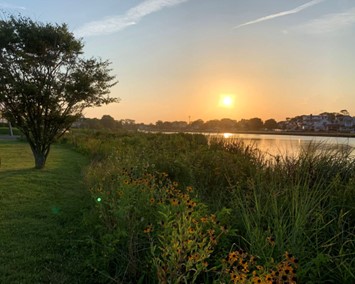Water Quality Restoration Grants for Nonpoint Source Pollution
THIS GRANT CLOSED JUNE 2, 2025.
PURPOSE OF FUNDING
Water quality restoration grants are awarded by the Department of Environmental Protection (Department) to fund watershed restoration activities and initiatives around New Jersey that address nonpoint source pollution (NPS), which is water pollution that is generated by everyday activities. Generally, grants are focused on restoration of water quality impaired predominantly by NPS pollution for waters located in a priority waterbody or region where the grant will help implement an approved TMDL or Watershed Based Plan (WBP).
APPLICATION
Water Quality Restoration Grants 2025
APPLICATION DEADLINE
TBD
NOTIFICATION DATE
September 30, 2025
SOURCE OF FUNDING
STATUTORY CITATION
N/A
WHO IS ELIGIBLE
Applicants eligible to apply for funding under this RFP include:
- State, regional and local government units within New Jersey, including State government agencies, municipal planning departments or boards, health departments;
- County planning departments or boards, health departments;
- Designated water quality management planning agencies;
- State universities, and colleges;
- Interstate agencies of which New Jersey is a member;
- Watershed and water resource associations and other local nonprofit organizations recognized by the Internal Revenue Service under Section 501(c)(3) of the Internal Revenue Code authorized to operate in the State of New Jersey.
QUALIFICATIONS REQUIRED FOR CONSIDERATION
Eligible applicants shall, in their application, demonstrate that they possess the following:
- Sufficient staffing and other resources with the capability, expertise, and environmental experience to perform the proposed project directly or through contracting services.
- The ability to establish and maintain partnerships to ensure project implementation as well as long-term operation and maintenance/management.
- Authority to implement the proposed project(s) and property or other access rights to construct the project. Although a monetary match is not required for projects to be funded, the percentage of monetary contributions and in-kind services will (see Appendix B, Project Evaluation Criteria), and can increase the proposal selection. This type of support demonstrates a long-term commitment to overall project success.
- In addition to meeting the specifics of the grant opportunities described in Section 4 above, eligible projects must be:
- Well-designed to achieve the project goal of NPS pollution reduction and presented in the proper sequence of events (goal/objective/task).
- Consistent with existing local, state, and federal requirements and can obtain permits needed to implement the project.
- Viable and readily implementable (shovel ready).
- For proposals that do not include construction (e.g. planning, outreach and education), the proposal must include deliverables such as schedules, reports, training/outreach products, and inventories.
- Able to be completed in a 3-year timeframe. Located on public property or on private property with an executed agreement with the property owner sufficient to allow for the project to be completed as proposed, including the required monitoring and evaluation element.
GRANT LIMITATIONS
Water Quality Restoration Grant funds may not be used for any of the following purposes:
- Projects that do not have a projected water quality benefit either through implementation of best management practices or through education, outreach, and stewardship;
- Projects, as determined by the Department, that could result in negative impacts to the environment, the waters of the state, biodiversity, or public health;
- Projects that incorporate the process of hydro-raking or weed harvesting;
- Maintenance activities, including but not limited to street sweeping and catch-basin cleaning otherwise required by state or federal regulations;
- Implementation of any permit or permit application requirements of federal, state, or local agencies;
- Projects that include the implementation of activities required by the New Jersey Pollutant Discharge Elimination System (NJPDES) regulations at N.J.A.C. 7:14A (e.g. municipal stormwater permit requirements or Watershed Improvement Plans); and
- Performance of any other ineligible activities based on current USEPA guidelines.
APPLICATION PROCEDURES
Applications must be submitted through SAGE.
ADDITIONAL INFORMATION
Two public information sessions will be held.
Public Information Session Part 1 of 2: April 15, 2025 at 10:00 AM.
Public Information Session Part 2 of 2: April 30, 2025 at 10:00 AM.
Previously awarded grants can be found here: Interactive Map | New Jersey Watershed Restoration Storymap
FOR MORE INFORMATION
Visit the Watershed Restoration Grant Unit website
Bureau Contact: Cathryn Schaffer
Email: npsgrants@dep.nj.gov or Cathryn.Schaffer@dep.nj.gov
Phone:(609) 984-0921
